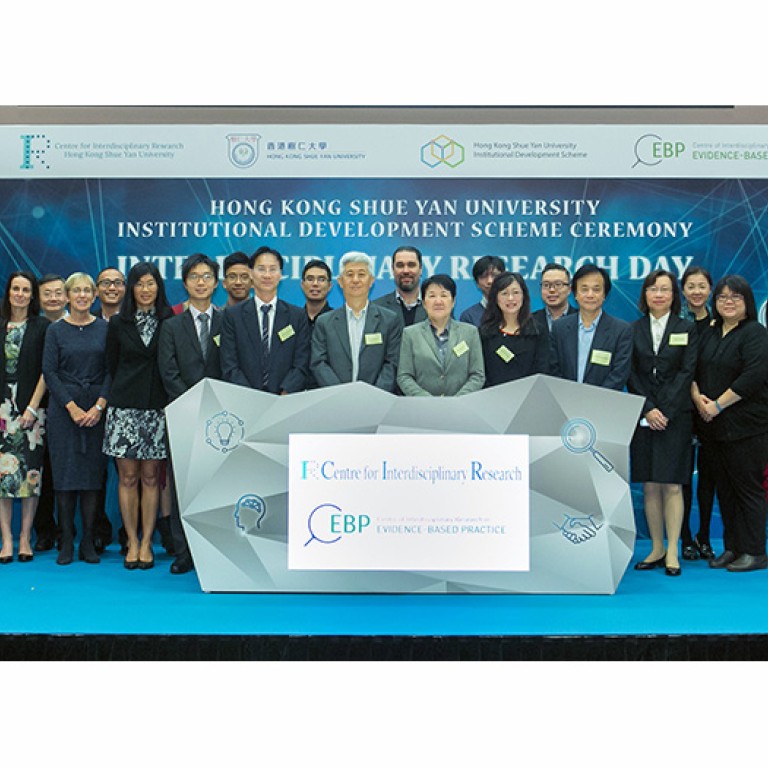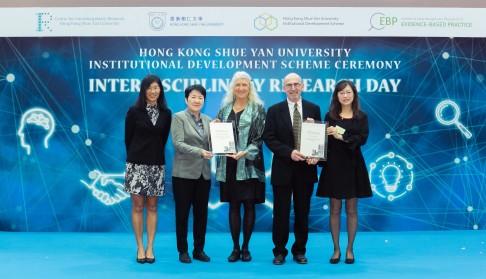
Shue Yan Interdisciplinary Research Platform Encourages Knowledge Transfer Across Disciplines
[Sponsored Article] On 15th November, Hong Kong Shue Yan University celebrated the successful conclusion of its first project under IDS, the Institutional Development Scheme, in which an interdisciplinary research platform has been established to bring bright and creative research ideas of interdisciplinary subjects to light.
[Sponsored Article]
On 15th November, Hong Kong Shue Yan University celebrated the successful conclusion of its first project under IDS, the Institutional Development Scheme, in which an interdisciplinary research platform has been established to bring bright and creative research ideas of interdisciplinary subjects to light. “This platform is a “space for growth and change”. All members in the Shue Yan community including teachers, students and alumni are encouraged to participate in the platform and learn from ample scholarly insights and interesting ideas in interdisciplinary research”, said Prof. Catherine Sun, Academic Vice President of Shue Yan. The platform operating since 2015 has a mission to promote interdisciplinary research in three main areas, namely Brain-Based Teaching and Learning, Decision-Making, and Negotiation and Persuasion. These areas involve the study of business, education, psychology and law, and are indeed the prominent fields in which Shue Yan has had considerable success in developing its competitive career-oriented programmes over the past forty-five years.

Being the first private university in Hong Kong, Shue Yan is driven first and foremost by a strong commitment to nurturing well-balanced and efficient young adults, who are able to combine academic knowledge with professional and practical skills. Accordingly, Shue Yan has strategically chosen ‘Brain-Based Teaching and Learning’ as its first-year theme of the IDS project, because it involves academics from diverse backgrounds to examine how the brains learn. Experts such as neuroscientists, language specialists, cognitive psychologists, and frontline educators from all disciplines providing direct teaching to students are gathered and ventured into this emerging and fascinating area of study. “In recent years, student-centred pedagogy is getting more important in higher education because it engages students in their own pursuit of academic excellence, and incorporates their interests and skills into the learning process. This proves to be crucial for their career development later in life. From the perspective of educators and researchers, by understanding the workings of students’ mind within the context of tertiary education, they can then work together to generate invaluable knowledge concerning the brain mechanisms of learning, and to translate this knowledge into creative, practical and evidence-based teaching pedagogy, thus maximizing students’ learning potential.” Prof. Sun explained.
While studying how the brains learn promotes quality education, by investigating how the brains make choices and decisions also broadens our conceptual knowledge in human behaviors and expressions. Shue Yan has selected ‘Decision-Making’ as its second-year theme to explore the neural correlates of decision-making. Contemporary neuroscientists believe that certain regions of animals and human brains are involved in their decision-making and risk-taking behaviors. These neural factors influence our choices and lead to different behavioral consequences which can be very bad, for instance, for addictions and obesity. Leveraging its new infrastructure such as the Transcranial Magnetic Stimulation Laboratory and the Transcranial Direct Current Stimulation Laboratory, and research experts for conducting cognitive task analysis, Shue Yan is now able to collect empirical evidence on human judging processes, and further externalize the acquired knowledge in real-life situations to bring about socio-economic impact and improvements to the community and businesses.

This year, Shue Yan focuses on conflict resolution and looks into the area of negotiation and persuasion. “This theme is a pressing issue in the present time as we are now living in a world where various conflicts, whether on resources, political views, and ideas, are frequently found at different levels. It is therefore of utmost importance to understand how conflicts are perceived and handled in different cultures and to find out what persuasion, negotiation, and mediation strategies are the most effective”, said Prof. Selina Chan, Director of University Research of Shue Yan. Undoubtedly, interdisciplinary approach is an effective way to enhance conflict resolution. The platform is therefore built to combine the wisdom of different disciplines, thereby Shue Yan will enrich the practical and theoretical aspects of persuasion, negotiation and mediation. “It allows, for instance, historians, journalists, and psychologists to work together to resolve conflicts and construct restorative justice, bringing victims or wounded communities together, and healing them through various means, such as Holocaust museum and commemoration of war; sociologists and anthropologists can also explore cultural mechanisms for dealing with social conflicts, and guiding individuals towards the observation of social rules. In legal aspect, mediation is a friendly form of interference which solves conflict. In everyday life, mediation has become very common in resolving marriage and domestic disputes, as well as contract and civil damage cases.” Prof. Chan continued, “This strategic research area will aid knowledge transfer, improve professional practices, empower local communities and marginalized groups and enhance individuals’ quality of life.”

Since 2015, Shue Yan has been inviting various scholars in these three areas to visit the University and interact with local academics through this platform. As of present, over forty lectures and workshops were organized, and over twenty five overseas and local scholars were invited to share their insights and experience in research and teaching. In the grand finale of the project, there were also five scholars invited to share their research about conflict resolution with the audience. Their works ranged across diverse topics including creative mediation, neuroethics, encouragement in mediated resolution and restorative justice. Participants were actively engaged and highly involved in the discussions. Though the project has now come to an end, the platform is fully developed and renamed to ‘Centre for Interdisciplinary Research’, which will continue to promote interdisciplinary research at Shue Yan and facilitate the transfer of knowledge to society and industry.
